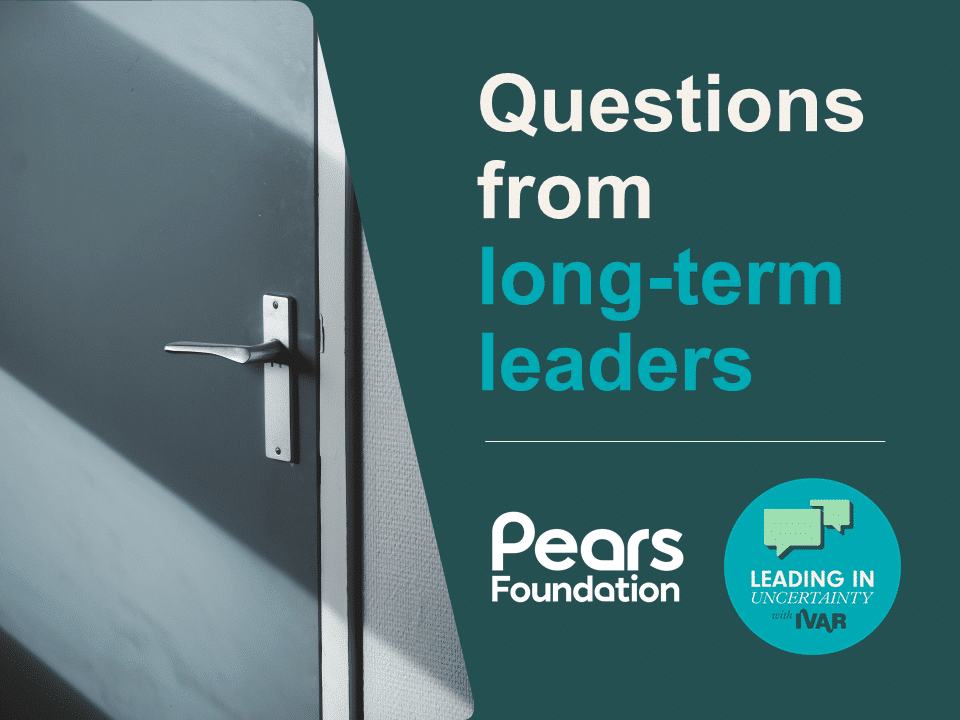This series shares some of the challenges 12 long-term leaders have been exploring together over the past 18 months, in regular sessions facilitated by our co-founder Director (and long-term leader himself) Ben Cairns. Convened by Pears Foundation, most of the group have been in their senior leadership post for 10 years or more, and many are also founders, or were instrumental to the founding of, their organisation.
The group started meeting before the Covid-19 pandemic, and then continued remotely, so their discussions spanned both pre- and post-Covid contexts. And while this series explores questions that were raised by long-term leaders, we believe that many of their considerations will resonate with all social sector leaders and professionals.
This blog series forms part of our work on Leading in uncertainty.
How can I stay inspiring and inspired?
‘Holding on to your mojo’ can be really challenging: ‘Remaining an inspiring leader requires me to be an inspired leader’.
The challenge of maintaining motivation and inspiration is complex, and layered – particularly in the wake of Covid-19:
- Energy: ‘We’re lacking where we get our nourishment from. We all do these jobs not to make our fortune, but because we believe in our causes. Before Covid you could always step out and get some form of nourishment from faces, the team and events. But working from home on a computer, meeting after meeting, it’s the opposite of refilling the battery … it’s sucking’.
- Space: Leading a team with authenticity and empathy alongside maintaining energy to lead: ‘Being the wall that protects the difficulties and stresses of the team is a protective role, but can limit the space we have to be vulnerable.’
- Identity: Removing oneself from work (the team, developing new programmes, responding to updated restrictions and guidelines) when this is ‘life-giving for us’: ‘I’ve realised how much our identities are bound up with our work.’
- Sustained uncertainty: ‘It’s exhausting to keep adapting’. For most organisations, the initial response and adaptation to Covid-19 was adrenaline-fuelled and characterised by a real sense of drive and momentum. However, ‘we’re now in a handicapped situation where we’re struggling to do what we do best’; ‘Coming out of lockdown is harder than going in where there was adrenaline and pivoting. The ‘half in, half out’ is exhausting.’
What might help?
Delegating: ‘What is the impact – both on me and the organisation – of certain tasks and responsibilities losing their allure?’. On the one hand, long-term leaders want to hand over responsibilities but, on the other, they fear it: ‘It can be hard to trust someone else to deliver – especially if you’ve worked alone for a long time’. Some approaches that helped leaders to delegate were:
- Create a vacuum: ‘Deliberately creating a vacuum’ for certain key organisational tasks – thus creating space and opportunity for other people to take on greater responsibilities (and tasks traditionally associate with ‘the leader’) – has proven useful for increasing delegation across the team.
- Freedom within a framework: Instead of imposing a permanent task on someone and then withdrawing that responsibility if it goes wrong, there may be benefits in ‘the freedom of a framework’. Give permission for employees to take on a task for two months with a ‘see what happens’ mind-set. Although this approach can initially be challenging, it can lead to a sense of the whole team feeding into ideas and the development of the organisation as a whole, rather than the team second guessing what the Director would advise in certain situations.
- Openness to challenge and change: ‘Are you allowing yourself to be challenged?’. The importance of being challenged by colleagues and trustees increases over time and can be a strategy for avoiding allegiance to familiar patterns (e.g. falling into the mind-set of: ‘I’ve done it like this for the last five years’). It can help to encourage the team to embrace positive challenge, and avoid a culture of blaming others: ‘My accountability is to my team. My team visibly challenges me about the way we do things and that’s given space and isn’t squashed. This has had a snowball effect of “I’m allowed to fail, I’m allowed to challenge”’. This is part of the ‘freedom within a framework’ approach – providing opportunities to step into new responsibilities, within clear boundaries.
Co-directors ‘shouldering the weight’: being a Co-director can offer a sense of relief – ‘being Co-director is actually, dare I say, quite joyful – we’re equal, we get on, we can decide who’s best for [various roles]’.
Chair of Boards: for some leaders in the group, boards have played a key role in supporting them throughout this year – for many, engaged and reassuring Chairs are needed more now than in previous years. This support has included ‘bouncing ideas off’ and affirmation: ‘needing someone to say “no that’s not a good idea”, or “yes that’s great”’.



